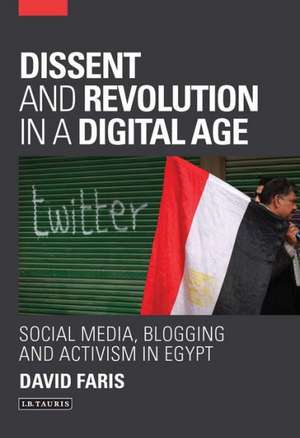Dissent and Revolution in a Digital Age: Library of Modern Middle East Studies
Autor David Farisen Limba Engleză Hardback – 29 mar 2013
Din seria Library of Modern Middle East Studies
- 30%
 Preț: 509.07 lei
Preț: 509.07 lei - 19%
 Preț: 467.21 lei
Preț: 467.21 lei -
 Preț: 166.82 lei
Preț: 166.82 lei -
 Preț: 158.64 lei
Preț: 158.64 lei - 31%
 Preț: 713.72 lei
Preț: 713.72 lei - 31%
 Preț: 712.90 lei
Preț: 712.90 lei - 31%
 Preț: 773.05 lei
Preț: 773.05 lei - 22%
 Preț: 269.28 lei
Preț: 269.28 lei - 19%
 Preț: 172.02 lei
Preț: 172.02 lei - 30%
 Preț: 716.63 lei
Preț: 716.63 lei - 30%
 Preț: 773.88 lei
Preț: 773.88 lei - 31%
 Preț: 713.72 lei
Preț: 713.72 lei - 30%
 Preț: 510.49 lei
Preț: 510.49 lei - 30%
 Preț: 714.12 lei
Preț: 714.12 lei - 26%
 Preț: 716.00 lei
Preț: 716.00 lei - 31%
 Preț: 772.74 lei
Preț: 772.74 lei - 18%
 Preț: 167.24 lei
Preț: 167.24 lei - 30%
 Preț: 774.01 lei
Preț: 774.01 lei - 31%
 Preț: 772.58 lei
Preț: 772.58 lei - 30%
 Preț: 715.34 lei
Preț: 715.34 lei - 31%
 Preț: 773.23 lei
Preț: 773.23 lei - 30%
 Preț: 773.75 lei
Preț: 773.75 lei - 19%
 Preț: 168.20 lei
Preț: 168.20 lei -
 Preț: 148.83 lei
Preț: 148.83 lei - 19%
 Preț: 448.18 lei
Preț: 448.18 lei - 31%
 Preț: 713.07 lei
Preț: 713.07 lei - 14%
 Preț: 714.77 lei
Preț: 714.77 lei - 14%
 Preț: 534.27 lei
Preț: 534.27 lei
Preț: 772.98 lei
Preț vechi: 1112.45 lei
-31% Nou
Puncte Express: 1159
Preț estimativ în valută:
147.91€ • 154.98$ • 122.27£
147.91€ • 154.98$ • 122.27£
Carte tipărită la comandă
Livrare economică 11-25 aprilie
Preluare comenzi: 021 569.72.76
Specificații
ISBN-13: 9781780761503
ISBN-10: 1780761503
Pagini: 267
Ilustrații: black & white halftones, figures
Dimensiuni: 140 x 216 x 28 mm
Greutate: 0.48 kg
Editura: I. B. Tauris & Company
Seria Library of Modern Middle East Studies
ISBN-10: 1780761503
Pagini: 267
Ilustrații: black & white halftones, figures
Dimensiuni: 140 x 216 x 28 mm
Greutate: 0.48 kg
Editura: I. B. Tauris & Company
Seria Library of Modern Middle East Studies
Notă biografică
David Faris is Assistant Professor of Political Science at Roosevelt University, where he teaches Egyptian and Middle Eastern Politics. He holds a PhD in Political Science from Pennsylvania University.
Cuprins
Chapter 1: Introduction; Chapter 2: A Theory of the Networked Revolt: Social Media Networks, Media Events, and Collective Action; Chapter 3: Agenda-Setters: Torture, Rights and Social Media Networks in Egypt; Chapter 4: New Tools, Old Rules: Social Media Networks and Collective Action in Egypt; Chapter 5: (Amplified) Voices for the Voiceless: Social Media Networks, Minorities, and Virtual Counterpublics; Chapter 6: We Are All Revolutionaries Now: Social Media Networks and the Egyptian Revolution of 2011; Chapter 7: Cascades, Colors, and Contingencies: Social Media Networks and Authoritarianism in Global Perspective.
Recenzii
Understanding the role of digital media in the evolution of the Arab Spring is a monumental task, and talking about 'Twitter Revolutions' or 'Facebook Uprisings' is a nonstarter. David Faris makes compelling arguments precisely because his analysis is not tied to a particular tool or application. With a focused study of Egypt, he is able to demonstrate the strong connection between social media diffusion and civic mobilisation. Yet through his comparative study of other recent digital uprisings, he is able to demonstrate a weak connection to the success of those revolutionaries who get inspired by digital cascades of information'. Philip N. Howard, Fellow of Princeton University and the author of The Digital Origins of Dictatorship and Democracy: Information Technology and Political Islam. (2010) 'David Faris has written a thoughtful, broadly comparative and theoretically informed analysis of social media in Egyptian politics over the last decade. With a wide range of rich examples, he shows how and where the new media environment mattered as well as where its impact has been exaggerated. A welcome contribution to the growing comparative literature on the political effects of the internet in the Arab world and beyond.' Marc Lynch, Associate Professor of Political Science at George Washington University and author of The Arab Uprisings: The Unfinished Revolutions of the New Middle East (2012). 'A powerful new contribution to the growing body of knowledge on social networks and political change, Dissent and Revolution in a Digital Age is an important resource for scholars, policymakers and activists seeking to understand the circumstances under which digital tools aid mobilisation and collective action in authoritarian contexts.' Shanthi Kalathil, co-author of Open Networks, Closed Regimes: The Impact of the Internet on Authoritarian Rule (2003).
